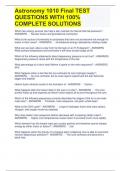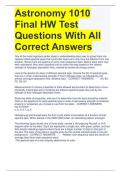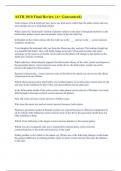Astronomy 1010 final test - Study guides, Class notes & Summaries
Looking for the best study guides, study notes and summaries about Astronomy 1010 final test? On this page you'll find 4 study documents about Astronomy 1010 final test.
All 4 results
Sort by

-
Astronomy 1010 Final TEST QUESTIONS WITH 100% COMPLETE SOLUTIONS
- Exam (elaborations) • 6 pages • 2023
-
- $12.99
- + learn more
Astronomy 1010 Final TEST QUESTIONS WITH 100% COMPLETE SOLUTIONS Which two energy sources can help a star maintain its internal thermal pressure? - ANSWERS Nuclear fusion and gravitational contraction What is the source of luminosity for protostars that have not yet become hot enough for fusion in their cores? - ANSWERS Gravitational energy released by infalling matter What can we learn about a star from its life track on an H-R diagram? - ANSWERS What surface temperature...

-
Astronomy 1010 Final HW Test Questions With All Correct Answers
- Exam (elaborations) • 16 pages • 2023
-
- $12.79
- + learn more
Astronomy 1010 Final HW Test Questions With All Correct Answers One of the most important earlier steps in understanding stars was to group them into classes called spectral types that could offer clues as to why they are different from one another. Shown here are spectra of some main-sequence stars. Before stars were very well understood, they were classified into an order that was based on the relative strength of hydrogen absorption lines, marked by arrows the image shown. Look at the ...

-
Stars and Galaxies 9th Edition by Seeds - Test Bank
- Exam (elaborations) • 479 pages • 2023
-
- $24.48
- + learn more
Chapter_03_Moon_Phases_and_Eclipses 1 The Moon moves slowly against the background of the constellations. True False 2 Any location on the Moon is sunlit for three weeks and is in darkness for one week as the Moon rotates. True False 3 In most months, there are no eclipses. True False 4 As the illuminated part of the Moon grows larger from new to full, it is said to "wane". True False 5 Our calendar divides the year into 30day periods in recognition...

-
Astronomy 1010
- Package deal • 17 items • 2023
-
- $73.71
- + learn more
Astronomy 1010 Exam 1 (A+ Guaranteed) ASTR 1010 Final Review (A+ Guaranteed) Astronomy 1010 Final Exam (A+ Graded already) ASTR 1010 Exam 1 (100% correct answers) ASTR 1010 (all correctly answered) Astronomy 1010 Midterm (100% correct answers) ASTR 1010 Test 1 (with accurate answers 100%) Astronomy 1010 - Chapter #5 (100% correct solutions) ASTR 10

How much did you already spend on Stuvia? Imagine there are plenty more of you out there paying for study notes, but this time YOU are the seller. Ka-ching! Discover all about earning on Stuvia


